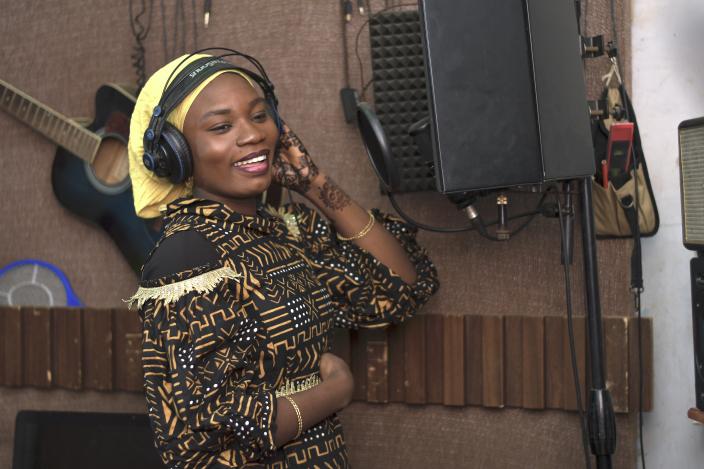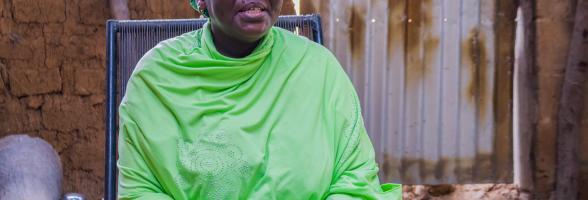“What motivates me, as I've always said, is my vision of an ideal world, a world where we all live in peace.”
Oumarou Hega Nourrath, better known as Nourrath la Debboslam, is a slam artist and is the director of the NGO Debbo'arts in Niger. To coincide with the UN Security Council's annual open debate on women, peace and security, we spoke to her about her work promoting peace in her community.
Question: Can you tell us about your community/society and the conflict or insecurity there?
Nourrath: I'm from Niger, and we live in a conflict zone with massive population displacements. According to the UNHCR, at least 300,000 children in the Tillabéri region can no longer attend school because of this situation. This has contributed to an increase in gender-based violence in communities affected by the crisis. In addition to this, insecurity in urban areas is a persistent problem that hampers the well-being of the inhabitants more and more each day.
In schools, young people are exposed to violent radicalisation at various levels. Young girls, in particular, are victims of sexual harassment, and in some cases are sexually assaulted by other pupils or even teachers. These threats lead parents to marry off their daughters before they reach adolescence, which unfortunately contributes to the prevalence of early and forced marriages in my community, and this is often done knowingly.
At home, some women suffer abuse from their husbands, including physical violence, and society often considers this to be normal. In Nigerien society, it is common to think that a woman should be "corrected" or "punished" if she is suspected of wrongdoing. These forms of violence against women are widely tolerated, and women are often reluctant to talk about them because of the taboos that persist in our society. Unfortunately, such violence has become a regrettable pattern for many men.
Today, this violence is being denounced because women have started to talk about it in their communities, thanks to the work of NGOs, the influence of social media and television, and the creation of women's groups across the country. Women can talk to each other and give each other advice.
Question : Can you describe your activity/initiative and the role you play?
Nourrath: Our NGO, Debbo'arts, is a young organisation, only a year old and made up of six members. We founded it collectively and are actively working to expand it. In addition to my role as coordinator, I am also a slam artist. Through my work, which has been broadcast in the media, I manage to convey important messages, particularly about peace and social cohesion. That's why the other members have chosen to join me in the fight against the challenges afflicting our society.
During this first year (2022), we succeeded in organising the first edition of a festival called "SARAOUANIA", which means "queen" in the Hausa language. This festival consisted of 48 hours of discussions with young girls from all regions of Niger, addressing various themes linked to the well-being of women. Among them, "art as a tool in the fight against violent extremism". These 48 hours were marked by intensive exchanges between us and the young participants. We were also lucky enough to invite experts on gender-based violence and community mediation, who greatly facilitated our discussions. At the end of the event, we drew up recommendations with the girls, which we incorporated into the activity report shared across social media.
Then we hosted the International Festival of African Cultures and Living Together, including the Night of Peace, which coincided with the International Day of Peace on 21 September 2023. We took advantage of this opportunity to promote peace through a caravan that we brought to various crossroads in Niamey, speaking in local languages. The caravan ended with an open-air concert with performances by artists who support our work. Initially, the festival was intended to last a week and include a fair called the "Musée des ethnies", which would have brought together all the communities living in Niger. However, because of the political crisis that the country has been going through since last July, we have limited ourselves to the Peul community of Niamey.
In the near future, we will be launching the "CAFE SAROUANIA" initiative, which consists of debates held every two months on our premises, bringing together young women around panelists to discuss themes related to women, peace, the country and possibly the sub-region. This initiative is meant to help the community in general, with a particular focus on women, and we plan to extend it to men to allow public debates on these subjects.
Question : Can you tell us about your career path and the challenges you faced (if any)?
Nourrath: As with all artists, even male artists, getting started was particularly difficult, especially here in Niger. My parents were adamant, and some of my friends often asked me, "What exactly are you doing in this business?" I remember when I was still at university, my father asked me to stop appearing on television altogether. However, with time, he finally agreed. My mother regarded it as a stage in my youth, thinking that it would eventually pass. In reality, I started getting involved in acting at a very early age, when I was in primary school, as a dancer and then as an actress in a film. My mother always managed to convince my father that I was just reading poems on stage. Over time, we incorporated rhythms into our slams, which my parents eventually accepted. Their main concern was to make sure I had a stable future, because at one point I was financially dependent on them. It's important to note that in Niger, it's often difficult to find a job after graduating. Thanks to my art, I was able to succeed and convince my family. As my parents' eldest child, I've even started to support them financially with household expenses.
In life, it's essential to know what you want and not to give up along the way, because other parents can use your success as an example to encourage their own children to pursue a career in the arts.
Question: Do you think women play an important role in achieving peace?
Nourrath: Women play an extremely important role in promoting peace. I endorse this point because, at the heart of it all, it is women who often have a crucial influence in households. In other words, the women at the heart of families are the ones who can have a positive influence on the men involved in conflicts. Women have the potential to change everything if they realise the power of their impact on society. To date, many women may not fully realise that they have the power to influence men's ideas.
It is encouraging to see that things are changing, even if there is still work to be done. However, for women to play their full part in promoting peace, they need to be informed, trained, have access to the media and actively participate in decision-making at all levels of society.
Question: Do you think that women play a significant role in building peace in your own context (village, town, country)?
Nourrath: Despite the quota law, which establishes a quota of women in elective offices, the authorities are finding it hard to enforce it in Niger. The 30% of positions reserved for women are not fully respected. For example, with the exceptional regime currently in place in the country, no woman is associated with the members of the National Council for the Safeguarding of the Homeland, even though the country has many women senior officers who have proved their worth in the army and administration in Niger. This is why I maintain that women are not sufficiently included in decision-making, and even when this happens, it should not be limited to a few women, but should include all Nigerien women. I therefore call for the genuine inclusion of all segments of society, men, women and young people, in the country's decision-making process, with the aim of eradicating all forms of violence in our nation.
Question: What are your goals and motivations for your initiative/activity?
Nourrath: What motivates me, as I've always said, is the vision of an ideal world that I have in mind, a world where we all live in peace. For me, the ideal Nigerien woman is one who fights for change, who demonstrates a certain level of leadership and who manages to assert herself. She's also a housewife who asserts herself, respects herself and accepts the opinions of others. For me, the ideal woman is one who manages to strike a balance between her life at home and her professional career without harming others or neglecting herself.
As far as the future is concerned, in 10 years' time, I see Debbo'Art becoming a very important organisation, even a large centre for young people and women who are victims of violence. I also plan to include a free training centre, where we will teach sewing, carpentry and art to young people. We would also like to help young people in conflict with the law, those who have been released from prison and need to be reintegrated into the workforce.

